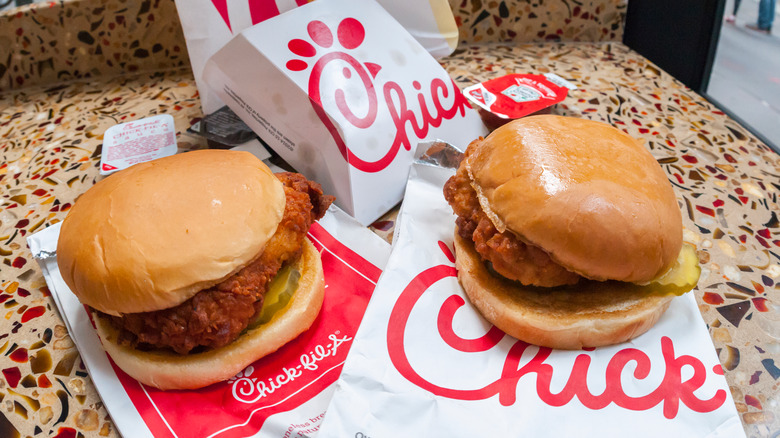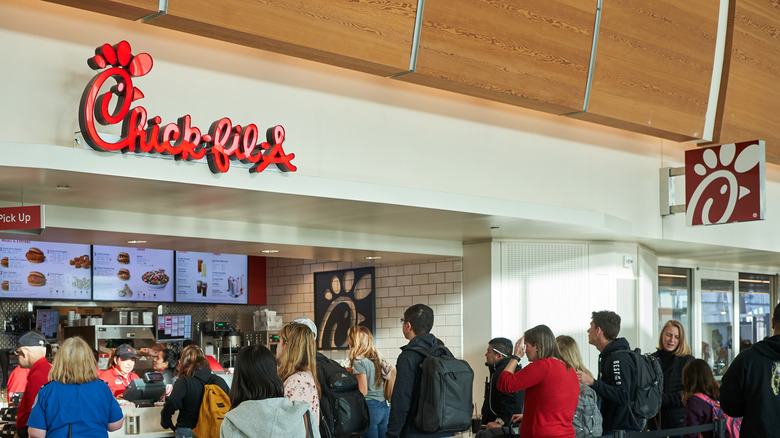The Chick-Fil-A Franchise That's Pioneering A Three-Day Workweek
It seems many people are striving to find the perfect work-life balance. However, most organizations wouldn't see it as ideal for their business. Prior to unions fighting for an eight-hour workday back in the 1800s, factory workers could be expected to work between 14 and 16 hours a day over a six-day week, per Striking Women. While we've come a long way since then, fighting for a living wage and reasonable hours to support that healthy balance is an ongoing issue. Of course, a business's main goal is profit, but at what cost to their employees?
One Chick-fil-A in Kendall, Florida, has decided to trial the perfect work-life balance by offering a three-day workweek to employees. As an indicator of how popular this idea is, the operator, Justin Lindsey, has received well over 400 applications to fill one full-time position. However, it's not just the idea of only having to work three days that's drawing the crowd. In a state with a minimum wage of $11 an hour, Lindsey is offering fast food workers $17 for non-management roles and $30-35 for management, per Today.
So, what's the downside?
There are positives and negatives to the system
To make a living wage that doesn't require you to find another job, you would need approximately $700 per week — based on a single person without children in Florida, according to MIT. In order to achieve that on a three-day workweek at $17 per hour, you would need to work 14-hour days.
While those hours seem incredibly long, according to Today, operator Justin Lindsey offers team members a choice of 15 or 30-minute breaks, which they can take whenever they want and as many as they want. "We put trust in our team, they're all adults, and they respond in a really cool fashion," Lindsey told Today. "They know the business has to run and they know what are goals are so they embody those goals."
Benefits to the system at the Kendall-based Chick-fil-A include knowing your schedule in advance so you can plan things like childcare and vacations. Employees who opt for the three-day system work three consecutive days of 12-14 hours and then have two weekends and seven days off each month. They also have the benefit of working with the "same people every day." While this system is almost unheard of in America, several European nations have been trialing four-day workweeks for several years now.
Where else has a shortened workweek been successful?
While Chick-fil-A's Justin Lindsey may be thinking of the welfare of his employees, supporters of the four-day workweek in Europe also suggest that a happy worker is a more productive worker, per Euro News. Countries such as the United Kingdom, Belgium, and Iceland have all had successful outcomes from trials of the program. In Iceland, over a period of four years, employers cut the regular 40-hour workweek to only 35-36 hours over four days without any pay decrease. The outcome showed that "worker stress and burnout lessened and there was an improvement in life-work balance."
Sweden also trialed the program with varied results where it worked in some industries but not others. Other countries such as Japan, where it's not unheard of for people to die from overwork (via Wired), are also thinking of trialing the system. Ultimately, although the system probably sounds much better to anyone eager for a break from the grind of the 40-hour work week, it probably isn't going to work for each and every person in any given industry. In fact, even one of its biggest proponents admits as much.
"The reality is this schedule doesn't work for everyone. Not everyone wants to work longer days," Lindsey told Today. "But for the ones that it does, it's cool to see the positive impact it's had on their lives." Given the fact that some restaurants may still struggle to find new employees in 2022 (per Restaurant), perhaps Lindsey's model could be in the cards for other hospitality organizations.


